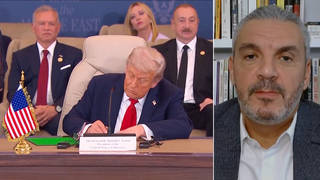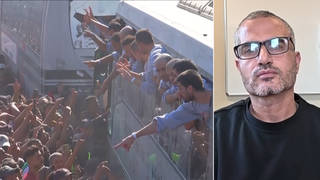
Guests
- Pratap Chatterjeeinvestigative journalist. He is managing editor of CorpWatch, which investigates and exposes corporate crimes. He is also the author of Iraq, Inc.: A Profitable Occupation.
A draft report by the U.S. Government Accountability Office shows between 100,000 and 300,000 barrels a day of Iraq’s declared oil production over the past four years is unaccounted for and could have been siphoned off through corruption or smuggling. The news comes as the Iraqi Parliament is preparing to vote on a new law that would open up Iraq’s oil reserves to multinational oil companies. CorpWatch director Pratap Chatterjee has closely monitored the Iraqi oil industry. He speaks to us from Houston, where Halliburton is preparing to hold its last annual shareholders meeting in Texas before moving headquarters to Dubai in the United Arab Emirates. [includes rush transcript]
Transcript
AMY GOODMAN: Between 100,000 and 300,000 barrels a day of Iraq’s declared oil production over the past four years is unaccounted for and could have been siphoned off through corruption or smuggling. These are the findings of a draft report by the U.S. Government Accountability Office obtained by The New York Times. The news comes as the Iraqi Parliament is preparing to vote on a new law that would open up Iraq’s oil reserves to multinational oil companies.
Our first guest today, Pratap Chatterjee, has closed monitored the Iraqi oil industry. He is the managing director of CorpWatch and author of the book, Iraq, Inc.. He’s also just published a new report on Halliburton called “Goodbye Houston.” Pratap joins us in Houston, Texas, where Halliburton is preparing to hold its annual shareholders meeting on Wednesday. This year’s shareholders meeting is the company’s last in Texas before moving headquarters to Dubai in the United Arab Emirates. Welcome to Democracy Now!, Pratap.
PRATAP CHATTERJEE: Amy, thank you for having me.
AMY GOODMAN: It’s good to have you with us. The subtitle of your report, “Goodbye Houston,” is “Conflict, Climate Change & Catastrophe, An Alternative Annual Report on Halliburton.” Talk about the meeting tomorrow and your preparations.
PRATAP CHATTERJEE: Amy, Halliburton makes its money out of two primary industries: the oil industry and the occupation of Iraq. Today, in fact, in the last four, perhaps a little over four, years, it’s made over $20 billion from providing military support in Iraq, building bases, cleaning toilets, providing food to the soldiers, as well as being given money to fix the oil infrastructure in Iraq, which they have actually failed to do.
In fact, Iraq’s oil infrastructure is in a sad shambles, and partly it’s Halliburton and it’s — there’s another company from Pasadena, California, which is called Parsons. Neither of them have repaired the infrastructure. And, in fact, today, one of the reasons — Amy, you mentioned that up to 300,000 barrels of oil are going missing every day — a lot of this is because the oil metering, which is really actually quite a simple business, has not been done. In four years, they have failed to repair and failed to calibrate the oil meters in the platforms. They’ve just finished repairing it. But I’ve talked to folks here in Houston. This is a very common and normal industry practice to set up meters. Even the most complex meters take no more than a year to set up, and yet they have not been calibrated. And so, oil is being stolen right under the noses of U.S. officials from the oil platforms out in the Arabian Gulf.
Now, Halliburton, which is also required — was asked to fix the oil infrastructure, such as the pipelines that run from Kirkuk to Beiji to supply the refineries, have done a terrible job. This is one of the big problems that Halliburton is facing today with its subsidiary Kellogg Brown & Root. They’re actually spinning off this particular part of the company, because it’s not doing very well, because they want to focus in where they make their money, which is the oil and gas industry and other places, such as Africa and the Middle East. And, in fact, David Lesar, the CEO of Halliburton, will be leaving right after the meeting. He’ll be going to Sheikh Zayed Road in Dubai to set up offices there, because that’s where they hope to make their profit, is out of the oil and gas industry.
The question we’re raising is, what will this mean in terms of the tax revenue to the United States? Halliburton had to pay an extra billion dollars in taxes this year. When they move to Dubai, will they pay taxes? Certainly, David Lesar, the CEO, will not have to pay taxes, because it’s a tax haven. So it means a lot less money for the United States and for taxpayers. And so, on the one hand, when they get $20 billion in taxpayer money to spend in Iraq, they are not paying taxes just like you and I might have to do every April 15.
AMY GOODMAN: What does it mean for criminal liability for the company to move?
PRATAP CHATTERJEE: These are good questions. So far, actually, six managers and suppliers have been indicted, and some of them have gone to jail. Not all of them have gone to jail. And one, for example, one person who was actually named by the Department of Justice as having absconded with money, his name is Ali Hijazi, and he’s in Kuwait. And I actually spoke to him in January when I was in Kuwait, because he, as I understand, is not required, and there is no extradition treaty that can require him to come back to the United States. So in the future, if there is any problem and there are officials that are charged and they’re in Dubai, because Dubai has no extradition treaty — I’m not suggesting that they are, in fact, criminally liable, but if they are, they can actually stay there, not have to leave, just as Ali Hijazi can stay in Kuwait without being brought before justice to decide whether or not they have been involved in criminal activity. So these are issues. These are serious issues. We don’t know whether anybody has stolen money for sure, but should that happen, it may make it complicated.
AMY GOODMAN: You talk about public interest data stamped “proprietary.”
PRATAP CHATTERJEE: Amy, normally when companies get business with the United States, they have to submit — this documentation is available to us, journalists, the general media, through the Freedom of Information Act. Halliburton has actually stamped almost every page of its documentation as proprietary. The reason they say that is because if the public gets hold of it, it will represent a threat to their business, because their business secrets might be exposed, and they would not get contracts if, let’s say, a rival company such as a Bechtel or Fluor/Parsons bids against them.
Now, the problem is — and we saw this actually last year when Henry Waxman uncovered one of the documents that was stamped proprietary, and they required that the public not see — was all the information that they have had redacted has been the information that, in fact, shows that the military is questioning a lot of their costs. $2.7 billion, and this is $2.7 billion out of $20 billion, are in question, and unsupported costs had been raised by military orders. Now, we don’t know if all of this money has disappeared. Some of it may simply be missing receipts. But all that money being questioned, you cannot — we, as the public and the taxpayer, cannot find out about, because Halliburton has said this represents important data that, if their rivals see it, could win contracts.
And this, to me, seems like a little bit of a problem, because if there is money that’s missing, the public needs to know. And, in fact, if it is a business secret, then we will have no way of judging whether or not the contract should go to somebody who is more competent and less likely to overcharge.
And these are some of the biggest charges against Halliburton, has been the fact that there’s been overcharging, there’s been waste, as well as fraud. And so, there are several lawsuits that have been launched. There’s a lawsuit by Julie McBride, for example, who has charged the company has been overcharging for a provision of food. There are serious lawsuits by truck drivers that were lodged here in the city of Houston, who say the company didn’t provide them with adequate security. Now, that case has been thrown out of court, but it’s on appeal now. So these are the issues that Halliburton will have to address and they are trying to avoid today.
AMY GOODMAN: Pratap Chatterjee, you have an interesting section in your report, “Goodbye Houston,” called “Dressing for Dubai”: “Dressed to impressed: Do you know what to wear when you travel?” And it shows you what’s not appropriate, which is wearing a T-shirt that says “Army,” and what’s appropriate, one that has no words on it.
PRATAP CHATTERJEE: Amy, the reason for this is in Dubai and in the Middle East, in fact, there’s a lot of anger towards Americans and towards the occupation of Iraq, and therefore, also to the contract workers that are there. And having been to Dubai myself several times, you notice, in fact, in contrast to, let’s say, neighboring Kuwait, the soldiers dress down. They go out in civilian clothes, because they don’t want to attract attention. And so, on the one hand, this article that you are citing, in fact, comes from Halliburton’s own internal newsletter called The Monthly Mirror, where they show these two photographs of the man, what they should wear, which is to dress down and pretend to be an ordinary civilian, as opposed to wearing a KBR hat, a Halliburton hat, or an Army shirt, which would indicate they were part of the occupation forces in Iraq, because they know that’s a flash point. I mean, remember that dozens of Halliburton workers have been killed in Iraq and more from other companies — in fact, a company called Titan — and so they are worried that, in fact, that people will see them as collaborators and see them as part of this whole American experiment in the Middle East. And so, they are advising their workers to pretend that they are just ordinary civilians, as opposed to involved with the American occupation of Iraq.
AMY GOODMAN: Pratap, I was watching Senator Mitch McConnell this weekend on CNN saying that it’s outrageous that the Iraqi government has yet to move on, that the Parliament there has yet to vote on the new law that would open up the country to multinational oil companies. What about that law?
PRATAP CHATTERJEE: Well, Amy, the fact that the Parliament has started to discuss this oil law is a good thing. I mean, the public should be able to debate an oil law. Remember, this oil law was drafted in secret. I met one of the men working on it, Ronald Jonkers from a company called BearingPoint, and they have worked, you know, in the Green Zone in Baghdad to draft a law and hand it over to Iraqi lawmakers, and the Bush administration has put pressure on them to sign it by this May, because they want it to go forward as one of the benchmarks for the U.S. to withdraw.
And the law, as it’s drafted, it’s a terrible law. It’s designed to try and please everybody and pleases nobody at all. And, in fact, it is particularly intended to please multinational oil companies. Iraq needs a lot of money in order to be able to develop its oil fields. They talk about in the region of $100 billion. And so, in order to get it, they say the only possibility is to get it from the oil companies, and therefore, they are requiring in the oil law that long-term leases be signed with oil companies from outside the country. Now, Iraqi oil unions oppose this law. A lot of Iraqi parliamentarians oppose this law, because they see it as giving up their state assets to foreign companies.
The reality of this law is that it leaves very little room for negotiation, which is critical in these laws. I mean, take the care of Bolivia recently. Bolivia recently renegotiated its oil leases with oil companies in order to ensure that more income comes to the people, as opposed to just out to foreign oil companies.
And that’s really critical, that this law be debated, as opposed to being rammed through, written by a company like BearingPoint and rammed through without much discussion. So it is, in fact, flawed in any way you see, because of the way the control is divided up between the different regions and the central government. Everybody’s unhappy with it. And so, it looks unlikely to get passed, unless there’s complete pressure by the U.S. government, which is why there’s so much resistance.
AMY GOODMAN: Finally, we just have 30 seconds, but your plans for the shareholders meeting tomorrow?
PRATAP CHATTERJEE: At the shareholders meeting, Amy, I, as a shareholder, will attend. Outside, there will be protests by groups like Houston Global Awareness at 2301 Millbend Avenue in the Woodlands, which is about 30 miles from Houston. So people will be hosting a goodbye party. They have money with them: Hallibacon bucks, which they’re going to be giving away. It’s a goodbye party for David Lesar, because he’s leaving town, and they want to wish him bon voyage to Dubai, as he takes the money and runs from the United States, from Houston, to the United Arab Emirates.
AMY GOODMAN: Pratap Chatterjee, thanks very much for being with us, investigative journalist, managing editor of CorpWatch, which investigates and exposes corporate crimes. Pratap is also author of the book, Iraq, Inc.: A Profitable Occupation, joining from us Houston.












Media Options